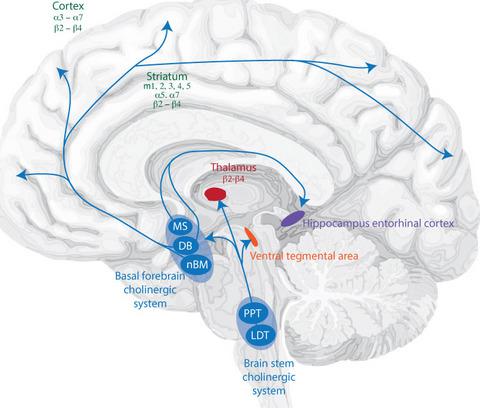当前位置:
X-MOL 学术
›
J. Neurochem.
›
论文详情
Our official English website, www.x-mol.net, welcomes your
feedback! (Note: you will need to create a separate account there.)
Tardive neurotoxicity of anticholinergic drugs: A review
Journal of Neurochemistry ( IF 4.2 ) Pub Date : 2020-11-21 , DOI: 10.1111/jnc.15244 Sina Marzoughi 1 , Ankur Banerjee 2 , Catherine R Jutzeler 3 , Marco A M Prado 4 , Jan Rosner 5 , Jacquelyn J Cragg 3 , Neil Cashman 1
Journal of Neurochemistry ( IF 4.2 ) Pub Date : 2020-11-21 , DOI: 10.1111/jnc.15244 Sina Marzoughi 1 , Ankur Banerjee 2 , Catherine R Jutzeler 3 , Marco A M Prado 4 , Jan Rosner 5 , Jacquelyn J Cragg 3 , Neil Cashman 1
Affiliation

|
The cholinergic system is a complex neurotransmitter system with functional involvement at multiple levels of the nervous system including the cerebral cortex, spinal cord, autonomic nervous system, and neuromuscular junction. Anticholinergic medications are among the most prescribed medications, making up one-third to one-half of all medications prescribed for seniors. Recent evidence has linked long-term use of anticholinergic medications and dementia. Emerging evidence implicates the cholinergic system in the regulation of cerebral vasculature as well as neuroinflammation, suggesting that anticholinergic medications may contribute to absolute risk and progression of neurodegenerative diseases. In this review, we explore the involvement of the cholinergic system in various neurodegenerative diseases and the possible detrimental effects of anticholinergic medications on the onset and progression of these disorders. We identified references by searching the PubMed and Cochrane database between January 1990 and September 2019 for English-language animal and human studies including randomized clinical trials (RCTs), meta-analyses, systematic reviews, and observational studies. In addition, we conducted a manual search of reference lists from retrieved studies. Long-term anticholinergic medication exposure may have detrimental consequences beyond well-documented short-term cognitive effects, through a variety of mechanisms either directly impacting cholinergic neurotransmission or through receptors expressed on the vasculature or immune cells, providing a pathophysiological framework for complex interactions across the entire neuroaxis.
中文翻译:

抗胆碱能药物的迟发性神经毒性:综述
胆碱能系统是一个复杂的神经递质系统,在神经系统的多个层面具有功能性参与,包括大脑皮层、脊髓、自主神经系统和神经肌肉接头。抗胆碱能药物是处方最多的药物之一,占为老年人开出的所有药物的三分之一至二分之一。最近的证据表明长期使用抗胆碱能药物与痴呆症有关。新出现的证据表明胆碱能系统参与调节脑血管系统以及神经炎症,这表明抗胆碱能药物可能会导致神经退行性疾病的绝对风险和进展。在这次审查中,我们探索胆碱能系统在各种神经退行性疾病中的参与,以及抗胆碱能药物对这些疾病的发生和进展可能产生的不利影响。我们通过在 1990 年 1 月至 2019 年 9 月期间在 PubMed 和 Cochrane 数据库中搜索英语动物和人类研究(包括随机临床试验 (RCT)、荟萃分析、系统评价和观察性研究)来确定参考文献。此外,我们对检索到的研究中的参考文献列表进行了手动搜索。通过直接影响胆碱能神经传递或通过血管系统或免疫细胞上表达的受体的各种机制,长期的抗胆碱能药物暴露可能会产生不利后果,超出有据可查的短期认知影响,
更新日期:2020-11-21
中文翻译:

抗胆碱能药物的迟发性神经毒性:综述
胆碱能系统是一个复杂的神经递质系统,在神经系统的多个层面具有功能性参与,包括大脑皮层、脊髓、自主神经系统和神经肌肉接头。抗胆碱能药物是处方最多的药物之一,占为老年人开出的所有药物的三分之一至二分之一。最近的证据表明长期使用抗胆碱能药物与痴呆症有关。新出现的证据表明胆碱能系统参与调节脑血管系统以及神经炎症,这表明抗胆碱能药物可能会导致神经退行性疾病的绝对风险和进展。在这次审查中,我们探索胆碱能系统在各种神经退行性疾病中的参与,以及抗胆碱能药物对这些疾病的发生和进展可能产生的不利影响。我们通过在 1990 年 1 月至 2019 年 9 月期间在 PubMed 和 Cochrane 数据库中搜索英语动物和人类研究(包括随机临床试验 (RCT)、荟萃分析、系统评价和观察性研究)来确定参考文献。此外,我们对检索到的研究中的参考文献列表进行了手动搜索。通过直接影响胆碱能神经传递或通过血管系统或免疫细胞上表达的受体的各种机制,长期的抗胆碱能药物暴露可能会产生不利后果,超出有据可查的短期认知影响,









































 京公网安备 11010802027423号
京公网安备 11010802027423号